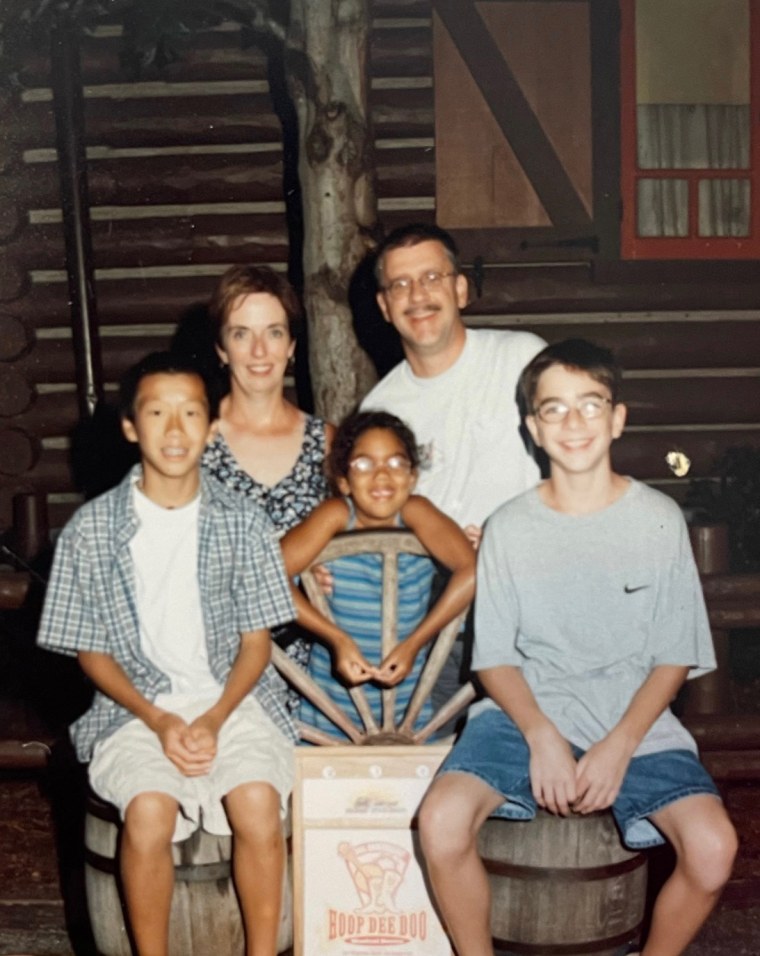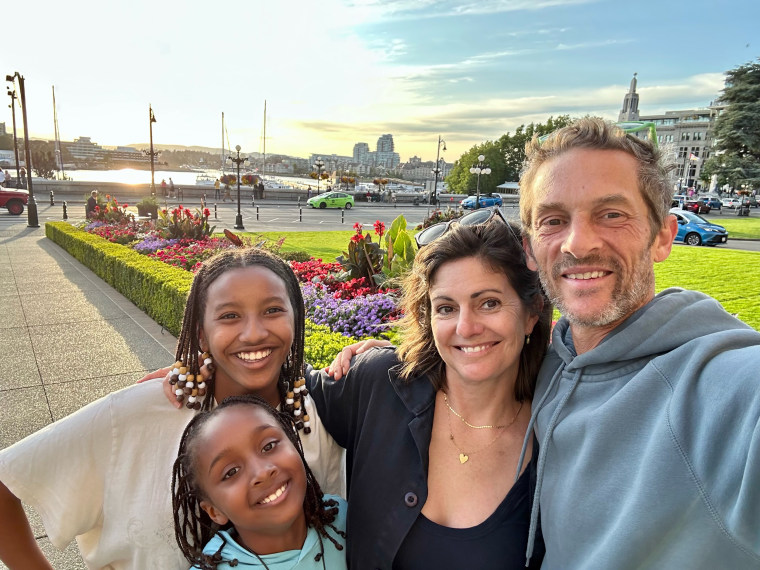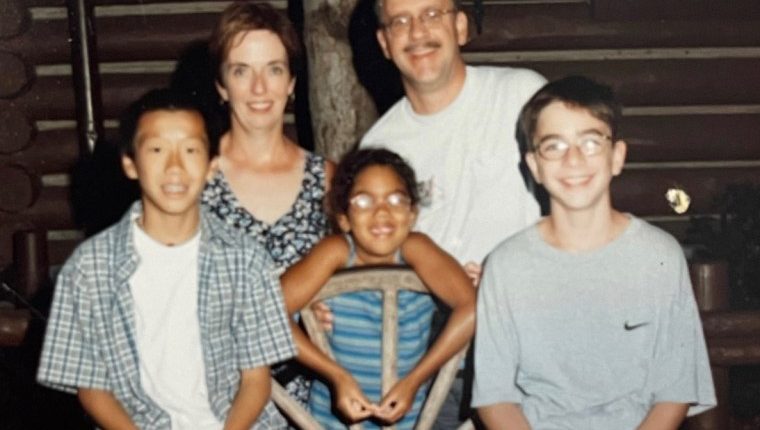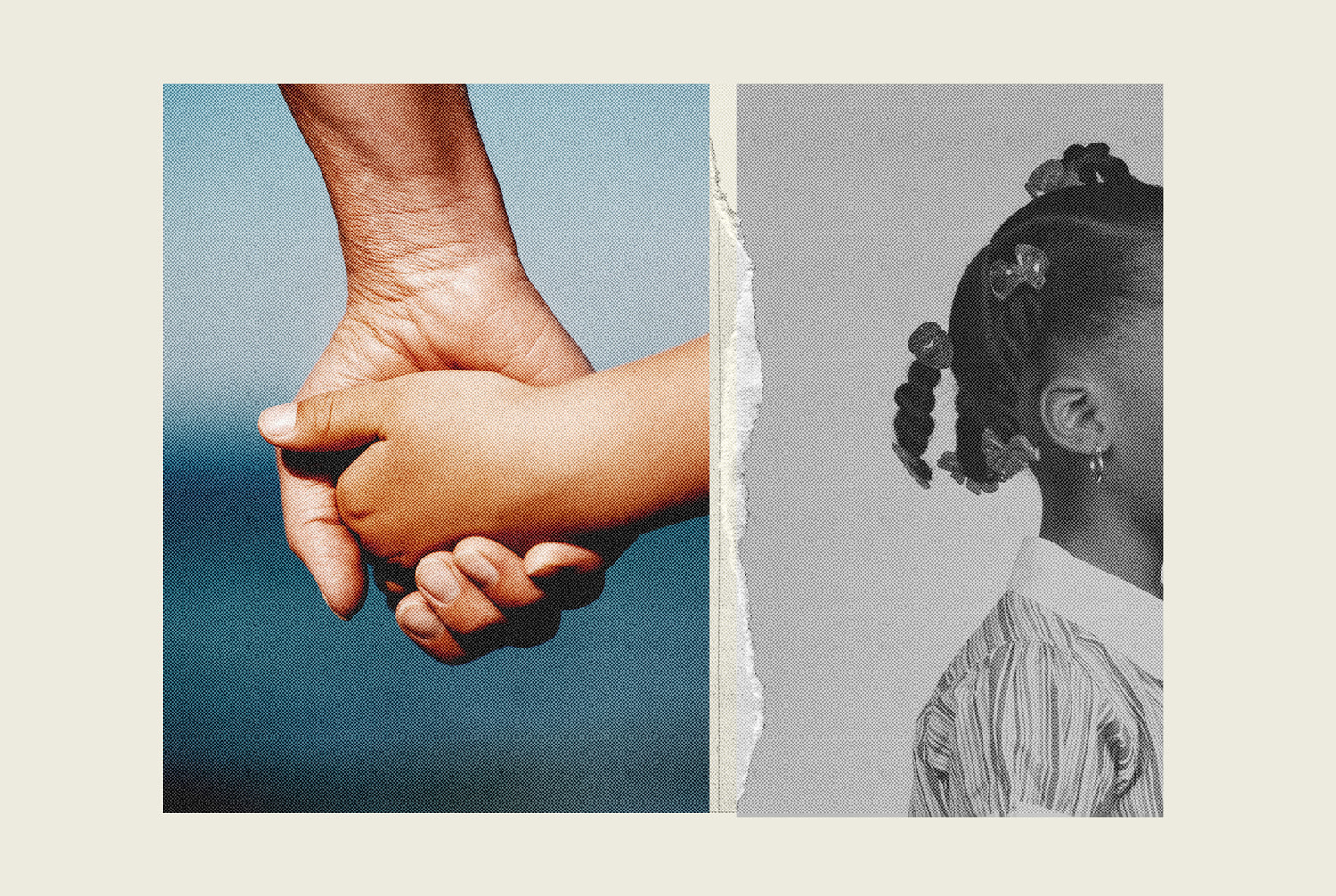On Sunday, Will, 36, posted what he thought was a harmless TikTok video of him brushing his infant daughter’s hair. In it, he calls on “Black TikTok” for advice on caring for the little girl.
“We have adopted a Black baby, her name is Zoë and I don’t know what to do for her hair,” he said in the since-deleted video. “Please, any Black parents or anyone who knows what to do with Black children’s hair, please help me in the comments.”
Along with sprinklings of advice about caring for Zoë’s hair, most of the social media users who responded accused him and his husband of adopting a Black child solely for social media content, and asking pointed questions in videos of their own: Did they not have Black friends they could talk to? Is Zoë just for show? Why didn’t they prepare to raise a Black child?
“I could have the best intentions and still mess up,” Will told NBC News, adding that he regrets sending the wrong message through his video and exposing his daughter “to the world in that way.” Will spoke on the condition that his last name not be used to protect his family’s privacy amid the backlash.
“I’ve learned that I need to be very intentional about the community that surrounds us and her on a consistent basis and have people who look like her talk to her,” he said. “I want Zoë to grow up to love herself, that includes her personality, her skin color, her hair, everything.”
White people adopting Black children, a form of transracial adoption, has been a topic of debate for decades, and fears of adoptive children being exploited on social media have only added fuel to the fire. Most adoptive parents in the U.S. are white, and about 30% of adoptions are transracial, with white parents of nonwhite children accounting for a majority of them, according to the University of Nevada, Reno and the Institute for Family Studies. Research has shown that Black adopted children with a strong sense of ethnic and racial identity experience positive psychological, academic and behavioral outcomes.
And Black children with white parents who minimize or erase racial differences often have a hard time developing their own racial identity, according to a 2008 report from the Evan B. Donaldson Adoption Institute, a since-closed research organization with much of its research and members now part of the National Center on Adoption and Permanency. In recent years, Black adoptees have been speaking about their experiences and raising awareness about the hardships of growing up in transracial adoptive families.
Hannah Jackson Matthews, 31, is one of those adoptees.
“I definitely dealt with a lot of early experiences of racism, discrimination, bias,” outside of the home, Matthews said.
She recalled one time at a childhood sleepover when she and other girls were doing each other’s hair. “When it came to my hair, the girl was like, ‘Well we don’t know how to do your hair, Hannah.’ Stuff like that stings. Feeling left out and like I was not supposed to be there,” Matthews said.
Adding to the sting was struggling with “feeling inadequate and misunderstood because I couldn’t bring those experiences home and expect that my parents would understand in the ways that I needed them to.”
Matthews founded HeyTRA, an online community and resource hub to help transracial adoptive families “navigate race, embrace racial identity, and combat racism and white supremacy.” She launched the resource in 2019, nearly 10 years after she began to explore the impacts of growing up with white parents. Matthews, who is both Black and white, was adopted as an infant. She said that although her parents had some conversations with her about race as a child, it wasn’t until college that she began to explore and develop her racial identity.
“Adoptees grow up racially, culturally isolated from other adoptees,” Matthews said. “With the Internet, we’ve been able to see that yes, we are a minority within a minority, but we’re not alone.”

Matthews, other advocates and experts agree that community is key when it comes to raising a Black child in a white family. The Donaldson report found that Black transracial adoptees (TRAs) experienced a greater sense of racial pride when their parents acknowledged race, enrolled them in diverse schools and provided them with Black role models. And other research has shown better outcomes among transracial adoptive families where white parents know Black history, live in diverse neighborhoods and surround themselves with Black families.
Will said he and his husband have talked about race and the ways racism will affect Zoë’s life. He added that he is in community with Black people and lives in a diverse neighborhood, so his friends have given him advice and guidance about caring for Zoë. In his excitement, he said, he went to TikTok for additional help. He said this in response to online claims that he did not begin to think about race until after Zoë’s adoption.
Karen Valby, a white woman who has two Black daughters, told NBC News that this experience is common among white adoptive parents.
“I think sometimes the anxiety and excitement of becoming a parent, for a white adoptive parent, trumps the responsibility of becoming a transracial adoptive parent,” said Valby, a writer and advocate for culturally competent transracial adoption. “What gets lost is the reality of bringing a Black child into your home.”
Valby, and her husband, Tim Dallesandro, both 49, began the adoption process some 15 years ago, for their daughters, now 15 and 9. They enrolled the girls in an all-Black ballerina class when they were each 2 years old, Valby said.

“That was the easiest, and most rewarding, tuition I’ve ever paid,” Valby laughed. “That put them in a room with other Black girls with puffs and brown tights and mothers who bothered them about putting lotion on their knees.”
She soon found herself and her family part of a community, one where her daughters “were the majority in the room.” The parents continued to expand their community with Black families and surrounded themselves with Black books, media and more. Valby said she talks to her daughter’s about race so much that they’re often “annoyed and overwhelmed” by it.
“If they feel like their corny, white mother has overcorrected or is smothering them with facts about Black history or Black talent, I can live with that,” she said.
For both Valby and Matthews, their experiences of transracial adoption began well before TikTok and YouTube became inundated with families highlighting their adoptive children, many too young to consent to such a thing. Matthews said she believes the practice to be “unethical.”
Online critics accused Will of using Zoë for similar content, but he rejected the claims, calling them “heartbreaking.”
“People said I viewed her as a prop or accessory and not a human being, and that’s not the case at all,” he said. “That’s not how I view my daughter at all.”
He said he’s spent the past few days learning from Black adoptees and parents and being receptive to the criticism he’s received. In just a few day’s time, he’s learned more about the complexities of transracial adoption and said he’s continuing to educate himself and amplifying the voices of transracial adoptees.
“I will continue to use every resource at my disposal to raise Zoë to be the best person she can be with the best parents we can be,” he said.
For more from NBC BLK, sign up for our weekly newsletter.
Source: | This article originally belongs to Nbcnews.com









